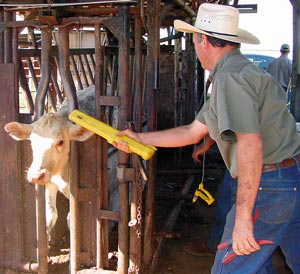Alabama Beef Connection

On a recent fall afternoon, Chuck Madaris of Circle E Farms in Fort Deposit and his nephew, Tyler, were working a new group of stocker calves. In addition to vaccinating them, Tyler was tagging the calves with a new type of tag. Traditional plastic ear tags used in beef cattle usually feature only an identification number. Depending on the farm’s system, that number may indicate dam and sire as well as birth month and year.The new tag these calves now sport in the left ear is an electronic identification tag (EID) that can hold a wealth of information about an individual animal.After the EID was in place, Madaris scanned it with a wand similar to those used in department stores. This brought up the animal’s record on a laptop computer stationed next to the working chute. Madaris had previously set up the basic form for this group of calves. He added the sire’s breed and the calf’s color by scanning bar codes. Then with a few key strokes, he added the farm where the calf was purchased, the vaccines administered, any antibiotics that may have been given and the dates the medicines were given.Josh Elmore, coordinator of the Alabama Cooperative Extension System’s Alabama Beef Connection, watched as each calf spent less than two minutes in the chute. “Some folks are going to wonder why go to this additional effort to put an electronic tag in,” said Elmore. “But those tags will allow farmers to follow their animals through the marketing chain until they are harvested.”At harvest, information about weight, quality grade and yield grade will be added to the animals’ records. That data will come back to the farmers. They can use that information to fine tune their operations to improve beef quality and overall herd productivity.”The Alabama Beef Connection (ABC) is a new program designed to provide an information network between producers and feedlots and packers. Unlike the Alabama Pasture-to-Rail Program, ABC allows producers to sell their calves through normal marketing options while still receiving performance information on their animals.Elmore said producers must meet several criteria to participate in the program like Circle E Farms does.”Producers must have completed Extension’s Beef Quality Assurance Training, and they must have an industry-accepted herd health program,” said Elmore. “There is also a $2 per head fee to cover the cost of the tags and administering the program.”ABC is a cooperative effort of Extension, the Alabama Beef Cattle Improvement Association, the Alabama Farmers Federation, the Alabama Cattlemen’s Association, the Alabama Livestock Marketing Association and the Alabama Department of Agriculture and Industries.Madaris said ABC offers him good value for the information he will get on his calves.
“We run about 250 purebred Chi-Angus and 600 commercial head here at Circle E,” he said. “We’ll buy about 1,000 or so calves from producers who used a Circle E bull to service their cows.
“If we did the electronic tagging through a commercial program, it would cost us between $9 and $10 per head.”Madaris noted that, in prior years, they tried to track performance data by visual evaluation and hand entering all of the data.”That took too many hours,” he said. “This is the second year that we have used the EIDs. Now you have to be computer literate, but once you get the system set up, it’s very workable. It’s saved us from having to use another hand to work the cattle.”Elmore cautioned that data would not provide an instant picture of a cattle operation.
“It will show you the variations that happen over time,” said Elmore. “Producers will be able to determine, for example, if calves from a certain sire grade higher more frequently than those of another sire. It will let producers evaluate how changes in management practices such as feeding or herd health impact the animals’ quality at harvest.”Dr. Lisa Kriese-Anderson, an Extension animal scientist, said she believes the program will continue to receive federal funding. “ABC funds are a line item in the federal agricultural appropriations package,” said Kriese-Anderson. “It’s been approved by the Senate for next year but still has to win approval in the House and be signed by President Bush.”This program is focused on beef producers and brings together all of the organizations in Alabama who work with beef cattle. It’s crucial that we all work together, enabling our producers to run more profitable operations.”Perry Mobley, beef director with the Alabama Farmers Federation, said ABC is a great program that provides producers the opportunity to retrieve feedlot performance and harvest data on their cattle without the risk of retained ownership. “I can already see benefits, as some producers will be receiving data on their cattle as early as February or March of 2004,” said Mobley. “These are cattle that would not have normally been tracked or had data gathered for the producer.
“In time, more and more small producers should be able to benefit from ABC as we see an increase in the number of graded feeder calf sales using electronic identification in Alabama stockyards. Currently, larger beef producers are more able to utilize the program, as it takes a truckload lot of cattle going to the same destination to be tracked.” Mobley added that Extension has provided critical leadership for the young program. “The Alabama Farmers Federation is committed to the continued support of the Alabama Beef Connection, and we look forward to even greater things to come from this and other Extension beef programs.”Maggie Lawrence is a communications specialist with the Extension System. For more information on the Alabama Beef Connection, contact Perry Mobley at 1-800-392-5705, ext. 4221 or pmobley@alfafarmers.org.
